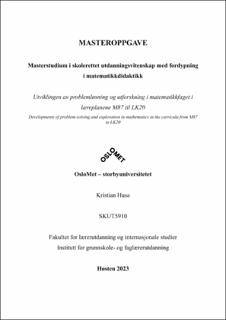Utviklingen av problemløsning og utforskning i matematikkfaget i læreplanene M87 til LK20
Master thesis
Published version
Permanent lenke
https://hdl.handle.net/11250/3120222Utgivelsesdato
2023Metadata
Vis full innførselSamlinger
Sammendrag
I et moderne kunnskapssamfunn er problemløsningsegenskapet høyt verdsatt. Samfunnsmessige endringer og teknologisk utvikling har radikalt endret både arbeidslivet og utdanningssystemet. I dag krever arbeidsmarkedet egenskaper som problemløsning og utforsking i samarbeid, i langt større grad enn tidligere. Dette skyldes i stor grad den økende kompleksiteten i arbeidsoppgaver og behovet for innovative løsninger på stadig mer komplekse problemer. Utdanningspolitikken har utviklet seg over tid for å reflektere samfunnets økende behov for kompetanser som kreativitet, problemløsning og samarbeid. I denne dokumentanalysen ble det utført en grundig gjennomgang og analyse av fire norske læreplaner for å utforske utviklingen av de pedagogiske begrepene «problemløsning» og «utforsking» innenfor matematikkundervisningen. Metoden som ble benyttet i analysen omfattet valg av relevante læreplaner, systematisk gjennomgang av innhold, og identifisering av nøkkelbegreper og mål knyttet til «problemløsning» og «utforsking». Læreplaner som ble inkludert spente seg over ulike tidsperioder og omfattet M87, L97, LK06 og LK20. Disse læreplanene ble valgt på grunnlag av deres representativitet for ulike tidsepoker i det norske utdanningssystemet. Ved å inkludere flere læreplaner fra forskjellige perioder, kunne analysen kartlegge utviklingen av pedagogiske aspekter over tid og identifisere endringer i fokus og prioriteringer. Resultatene fra dokumentanalysen avslørte betydelige endringer i måten «problemløsning» og «utforsking» ble behandlet i læreplanene. Mens M87 introduserte, men hadde begrenset omtale av disse aspektene og i hovedsak fokuserte på tradisjonell matematikkundervisning, ble det i senere læreplaner, spesielt LK06 og LK20, tydelig fremhevet betydningen av «problemløsning» og «utforsking» som integrerte elementer i matematikkundervisningen. Dette reflekterer en utvikling mot en mer helhetlig tilnærming til læring av matematikk, som inkluderer praktisk bruk av matematikk og kritisk tenkning. Denne innsikten kan være verdifull for beslutningstakere, lærere og forskere som arbeider med matematikkundervisning, da den gir et grunnlag for å forstå historiske endringer og utviklinger i utdanningssystemet. Det er tydelig at den nyeste norske læreplanen, LK20, ønsker å forberede elevene på de stadig skiftende utfordringene i samfunnet og arbeidslivet ved å gi dem verktøyene de trenger for å lykkes i en global kunnskapsøkonomi. Dette innebærer å utvikle evnen til selvstendig problemløsning, samarbeid, kritisk tenkning og metakognisjon, som er avgjørende ferdigheter for livslang læring, og dybdelæring er et nøkkelbegrep i denne sammenhengen.
In a modern knowledge society, problem-solving skills are highly valued. Societal changes and technological advancements have radically transformed both the workforce and the education system. Today, the job market demands skills such as problem-solving and exploration in collaboration to a much greater extent than before. This is largely due to the increasing complexity of tasks at work and the need for innovative solutions to ever more complex problems. Education policy has evolved over time to reflect society's growing need for competencies such as creativity, problem-solving, and collaboration. In this document analysis, a thorough review and analysis of four Norwegian curricula were conducted to explore the development of the pedagogical concepts of “problem-solving” and “exploration” within mathematics education. The method used in the analysis included selecting relevant curricula, systematically reviewing their content, and identifying key concepts and objectives related to “problem-solving” and “exploration”. The selected curricula spanned different time periods and included M87, L97, LK06, and LK20. These curricula were chosen based on their representativeness for different eras in the Norwegian education system. By including multiple curricula from different periods, the analysis could map the evolution of pedagogical aspects over time and identify changes in focus and priorities. The results of the document analysis revealed significant changes in how “problem-solving” and “exploration” were addressed in the curricula. While M87 introduced these aspects, it primarily focused on traditional mathematics education. Later curricula, especially LK06 and LK20, clearly emphasized the importance of “problem-solving” and “exploration” as integrated elements of mathematics education. This reflects a shift towards a more whole approach to learning mathematics, including practical applications of mathematics and critical thinking. This insight can be valuable for decision-makers, teachers, and researchers working in mathematics education, as it provides a basis for understanding historical changes and developments in the education system. It is evident that the latest Norwegian curriculum, LK20, aims to prepare students for the ever-changing challenges in society and the workforce by equipping them with the tools they need to succeed in a global knowledge economy. This involves developing the ability for independent problem-solving, collaboration, critical thinking, and metacognition, which are essential skills for lifelong learning, with deep learning being a key concept in this context.
